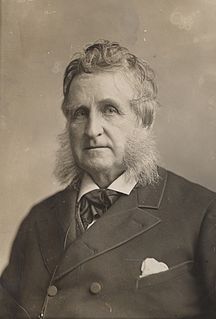A Quote by Victor Hugo
Great griefs exhaust. They discourage us with life. The man into whom they enter feels something taken from him. In youth, their visit is sad; later on, it is ominous.
Related Quotes
No man can promise himself even fifty years of life, but any man may, if he please, live in the proportion of fifty years in forty-let him rise early, that he may have the day before him, and let him make the most of the day, by determining to expend it on two sorts of acquaintance only-those by whom something may be got, and those from whom something maybe learned.
Only to two or three persons in all the world are the reminiscences of a man's early youth interesting: to the parent who nursed him; to the fond wife or child mayhap afterwards who loves him; to himself always and supremely--whatever may be his actual prosperity or ill fortune, his present age, illness, difficulties, renown, or disappointments--the dawn of his life still shines brightly for him, the early griefs and delights and attachments remain with him ever faithful and dear.
To be misunderstood even by those whom one loves is the cross and bitterness of life. It is the secret of that sad and melancholy smile on the lips of great men which so few understand; it is the cruelest trial reserved for self-devotion; it is what must have oftenest wrung the heart of the Son of man; and if God could suffer, it would be the wound we should be forever inflicting upon Him. He also - He above all - is the great misunderstood, the least comprehended.
A man's age is something impressive, it sums up his life: maturity reached slowly and against many obstacles, illnesses cured, griefs and despairs overcome, and unconscious risks taken; maturity formed through so many desires, hopes, regrets, forgotten things, loves. A man's age represents a fine cargo of experience and memories.
I remember that one time Carl Sagan was giving a talk, and he spelled out, in a kind of withering succession, these great theories of demotion that science has dealt us, all of the ways in which science is telling us we are not who we would like to believe we are. At the end of it, a young man came up to him and he said: "What do you give us in return? Now that you've taken everything from us? What meaning is left, if everything that I've been taught since I was a child turns out to be untrue?" Carl looked at him and said, Do something meaningful.
Youth is the season of tragedy and despair. Youth is the time when one's whole life is entangled in a web of identity, in a perpetual maze of seeking and of finding, of passion and of disillusion, of vague longings and of nameless griefs, of pity that is a blade in the heart, and of 'all the little emptiness of love.
The usual hero adventure begins with someone from whom something has been taken, or who feels there is something lacking in the normal experience available or permitted to the members of society. The person then takes off on a series of adventures beyond the ordinary, either to recover what has been lost or to discover some life-giving elixir. It's usually a cycle, a coming and a returning.
A man who was merely a man and said the sort of things Jesus said would not be a great moral teacher. He would either be a lunatic - on a level with the man who says he is a poached egg - or else he would be the Devil of Hell. You must make your choice. Either this man was, and is, the Son of God; or else a madman or something worse. You can shut him up for a fool; you can spit at him and kill him as a demon; or you can fall at his feet and call him Lord and God. But let us not come with any patronizing nonsense about his being a great human teacher. He has not left that open to us.
It cannot be denied that for a society which has to create scarcity to save its members from starvation, to whom abundance spells disaster, and to whom unlimited energy means unlimited power for war and destruction, there is an ominous cloud in the distance though at present it be no bigger than a man's hand.





































